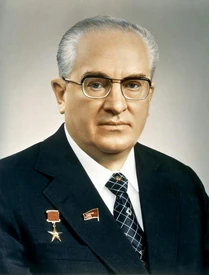| Yuri Andropov | |
|---|---|
| General Secretary of the Central Committee of the Communist Party of the Soviet Union | |
|
In office 12 November 1982 – 9 February 1984 |
Yuri Vladimirovich Andropov (15 June [O.S. 2 June] 1914 – 9 February 1984) was a Soviet politician and the fourth General Secretary of the Communist Party of the Soviet Union. Following the 18-year rule of the late Leonid Brezhnev, Andropov served in the post for only 15 months, from November 1982 until his own death in February 1984.
His appointment was received in the West with apprehension, in view of his roles in the KGB and in Hungary. At the time his personal background was a mystery in the West, with major newspapers printing detailed profiles of him that were inconsistent and in a few cases fabricated.
During his rule, Andropov attempted to improve the economy by raising management effectiveness without changing the principles of socialist economy. In contrast to Brezhnev's policy of avoiding conflicts and dismissals, he began to fight violations of party, state and labour discipline, which led to significant personnel changes during an anti-corruption campaign against many of Brezhnev's cronies. During 15 months in office, Andropov dismissed 18 ministers, and 37 first secretaries of obkoms, kraikoms and Central Committees of Communist Parties of Soviet Republics; criminal cases on highest party and state officials were started. For the first time, the facts about economic stagnation and obstacles to scientific progress were made available to the public and criticised.
In foreign policy, the war continued in Afghanistan, although Andropov - who felt the invasion was a mistake - did half-heartedly explore options for a negotiated withdrawal. Andropov's rule was also marked by deterioration of relations with the United States. U.S. plans to deploy Pershing missiles in Western Europe in response to the Soviet SS-20 missiles were contentious. But when Paul Nitze, the American negotiator, suggested a compromise plan for nuclear missiles in Europe in the celebrated "walk in the woods" with Soviet negotiator Yuli Kvitsinsky, the Soviets never responded. Kvitsinsky would later write that, despite his own efforts, the Soviet side was not interested in compromise, instead calculating that peace movements in the West would force the Americans to capitulate. On 8 March 1983, during Andropov's reign as General Secretary, U.S. President Ronald Reagan famously labeled the Soviet Union an "evil empire".
In August 1983 Andropov made a sensational announcement that the country was stopping all work on space-based weapons. One of his most notable acts during his short time as leader of the Soviet Union was in response to a letter from a 10-year-old American child from Maine named Samantha Smith, inviting her to the Soviet Union. Meanwhile, Soviet-U.S. arms control talks on intermediate-range nuclear weapons in Europe were suspended by the Soviet Union in November 1983 and by the end of the year, the Soviets had broken off all arms control negotiations.
Cold War tensions were exacerbated by Soviet fighters downing a civilian jet liner, Korean Air Flight KAL-007, which carried 269 passengers and crew, including a congressman from Georgia, Larry McDonald. KAL 007 had strayed over the Soviet Union on 1 September 1983 on its way from Anchorage, Alaska, to Seoul, South Korea. Andropov was advised by his Defence Minister Dmitriy Ustinov and by the head of the KGB Viktor Chebrikov to keep secret the fact that the Soviet Union held in its possession the sought-after "black box" from KAL 007.
In February 1983, Andropov suffered total renal failure. In August 1983, he entered the Central Clinical Hospital in western Moscow on a permanent basis, where he would spend the remainder of his life.
In late January 1984 Andropov's health deteriorated sharply and due to growing toxicity in his blood, he had periods of failing consciousness. He died on 9 February 1984 at 16:50 in his hospital room at age 69.

